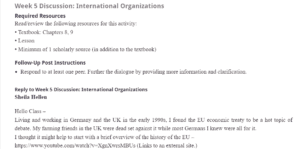International Organizations
Response to Faculty
Hello Professor Hellen,
Diplomacy is defined as the established way of influencing the behavior and decisions of a foreign government as well as its people through negotiations, dialogue, and other steps short of violence or war. Modern diplomacy practices result from the post-renaissance state system in Europe. A diplomat has different roles to play, including strengthening relations between nations, states, and organizations with others through the advancement of the former’s interests. To this end, activities on diplomacy aim at maximizing the advantages of the group without the expense or risk of using force and the most preferred, without resulting in resentment. A diplomat habitually without invariably striving to preserve peace and is strongly inclined to negotiate to achieve agreements and resolve issues between nations. Even during times of peace, a diplomat may still advocate for coercive threats such as economic threats, other demonstrations, or punitive measures. This is done in an attempt to show the nation’s capability to impose solutions that are unilateral to disputes through applying military power. However, normally, a diplomat will seek to develop goodwill toward the nation that they represent and nurture relations with foreign people and states that will ensure the latter cooperate or are neutralized when they fail to cooperate.
Response to Peer
Responding to John Dustin
Hello John,
Thank you for sharing your post. I read a few interesting facts about the EU. The EU is a forum that creates, for the member countries, binding treaties similar to the US laws created by the federal government. It oversees more than 28 European countries, of which the UK is one. Persons in the EU region are allowed to work in similar conditions in any of the member states without restrictions. With approximately €14 trillion in terms of services and goods, the EU economy is greater than that of the US. In 2016, the EU devoted approximately €144 billion, which is 1% of the annual budget. About 42% of this money was spent on supporting agriculture. As of 2015, the membership fee of the member countries into the EU was €13 billion, though the union at that time spent close to €8.5 billion on the UK, hence making its net contribution stand at € 8.5 billion,
ORDER A PLAGIARISM-FREE PAPER HERE
We’ll write everything from scratch
Question
Week 5 Discussion: International Organizations
Required Resources

International Organizations
Read/review the following resources for this activity:
• Textbook: Chapters 8, 9
• Lesson
• Minimum of 1 scholarly source (in addition to the textbook)
Follow-Up Post Instructions
- Respond to at least one peer. Further the dialogue by providing more information and clarification.
Reply to Week 5 Discussion: International Organizations
Sheila Hellen
Hello Class –
Living and working in Germany and the UK in the early 1990s, I found the EU economic treaty to be a hot topic of debate. My farming friends in the UK were dead set against it while most Germans I knew were all for it.
I thought it might help to start with a brief overview of the history of the EU –
https://www.youtube.com/watch?v=XgnXwrsMBUs (Links to an external site.)
Now, do your research… What some positive and negative aspects of this economic treaty/organization or another international organization? Explain your choice’s mission and function. Assess how issues of state sovereignty are dealt with for the member countries.
Be sure to cite an outside source and course material in your answer using the APA format. You may begin posting on Sunday, March 28. This DQ will close for grading on Sunday, April 04 at 11:59pm.
John Dustin
Professor and Class,
The European Union (EU) was started after World War II as way to secure peace and bring the nations of Europe together. Initially France and Germany combined their coal and steel production under a European organization set up for just this purpose (Department of State, 2021). By combining the manufacturing of these products, it was felt that war between these countries would be materially impossible in the future. There were six founding countries (Belgium, France, Germany, Italy, Luxembourg and the Netherlands) all of these countries established the common market in coal and steel. Other countries have since joined and the total is now 27 countries in the EU. England left the EU on January 31st, 2020.
What started as an economic union has changed over the years to encompass all aspects of society. Human dignity, freedom, democracy and equality are values that the EU demonstrate and are part of the Lisbon Treaty (European Union, 2021). All of the members of the EU have made it easy for people to travel between countries, there are no travel restrictions, and each country allows people to live and work in any country they choose. There is a single market which allows goods, services and money to move freely. The EU is the largest trading block in the world and is the world’s biggest exporter of goods and services.
The EU is governed by the European Parliament. States under the European Union do lose some of their independence in terms of economics, this is reflected in the inability to change or implement certain policies (Cobb, 2019). By giving up some of their sovereignty to the EU individual states have to be mindful that the actions they take affect all members. European Law takes precedence over the laws of the individual country.
References
Cobb, W.N. W. (2019). Political Science Today. [Bookshelf Ambassadored]. Retrieved from https://ambassadored.vitalsource.com/#/books/9781544358314/
Department of State. (2021). About the EU. U.S. Mission to the European Union. Retrieved from https://useu.usmission.gov/our-relationship/about-the-eu/ (Links to an external site.)
European Union. (2021). Goals and values of the EU. Retrieved from https://europa.eu/european-union/about-eu/eu-in-brief_en (Links to an external site.)

